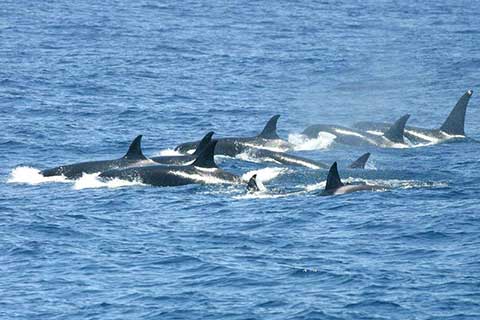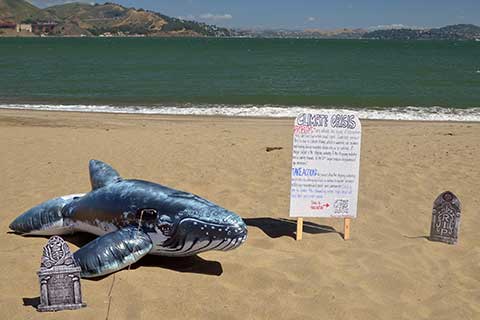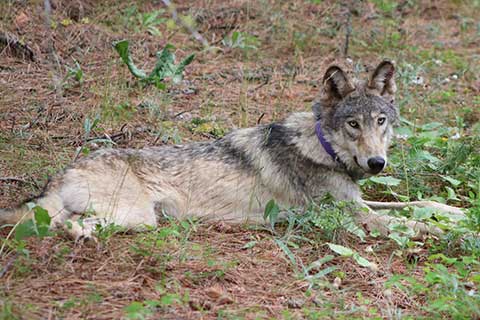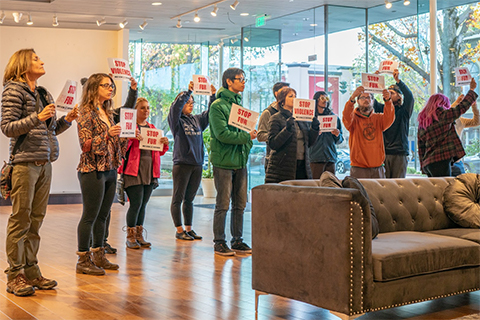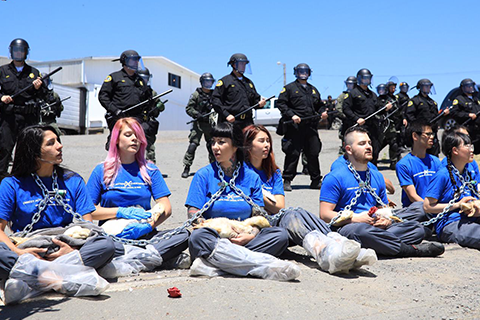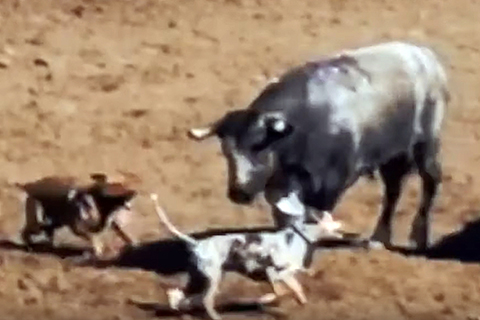Feature Archives
Responding to legal pressure from the Center for Biological Diversity, the federal government finalized a new rule on July 30 expanding critical habitat protection along the West Coast for critically endangered Southern Resident killer whales. The population of Southern Residents stands at just 74 orcas. The National Marine Fisheries Service designated 15,910 square miles of new critical habitat, expanding current protections in Washington’s Salish Sea south along the coasts of Washington, Oregon and California to Point Sur.
Tue Jul 27 2021 (Updated 07/31/21)
"A Wake for the Whales" Marks Bay Area Deaths, Calls for Protections
Conservation groups and whale lovers gathered on June 8, World Oceans Day, at Crissy Field Beach in San Francisco to honor the 12 dead whales that have washed up in the Bay Area this year and to call for greater protections. Attendees called for solutions to the three top threats to whales: ship strikes, entanglement in fishing gear and climate change. Against the backdrop of the Golden Gate, speakers at the event called for a mandatory 10-knot speed limits for ships passing through whale habitat along California’s coast.
Tue Jul 27 2021
New Wolf Pack Confirmed in California’s Plumas County
The California Department of Fish and Wildlife reported on June 23 that a new wolf pack has established itself in southern Plumas County. Named the Beckwourth pack, the group of three wolves was first confirmed in May but not officially announced. Photographs of the three wolves composing the Beckwourth pack were captured on a trail camera. A preliminary DNA analysis shows one wolf is LAS12F, a 2-year-old female wolf born into the Lassen Pack’s 2019 litter.
Tue Dec 17 2019
California Bans Fur Sales Statewide
Years of work by organizations including In Defense of Animals, PETA, The Humane Society of the United States, Direct Action Everywhere, and others have culminated in legislative victories to ban fur. City-wide fur bans were approved in Berkeley in 2017 and San Francisco in 2018. This October, California passed the nation’s first statewide ban on the sale of animal fur. The statewide ban goes into effect January 1, 2023. On November 29, in the long-time tradition of Fur Free Friday protests the day after Thanksgiving, DxE activists demonstrated at a Walnut Creek fur store on Black Friday, less than a week after the store’s opening.
Hundreds of Direct Action Everywhere activists occupied a Whole Foods store and an Amazon office in San Francisco on September 30, with dozens chaining and/or locking themselves in place until thirty-seven were arrested. Simultaneously, several activists chained themselves together inside an Amazon office in San Francisco. The following afternoon, activists urged the SF Board of Supervisors to support of “Rose’s Law: An Animal Bill of Rights.” In response to the protests in San Francisco, Whole Foods’ parent-company Amazon filed for a temporary restraining order against Direct Action Everywhere covering all California locations.
Sun Oct 6 2019 (Updated 10/07/19)
Animal Rights Activists Converge on Petaluma Slaughterhouse
On June 3, over 600 activists with the animal rights network Direct Action Everywhere (DxE) occupied Reichardt Duck Farm in Petaluma, a massive duck slaughterhouse. More than 75 were arrested, including the group’s co-founder, Wayne Hsiung, who has now accumulated 17 felony charges in Sonoma county and around the country in an effort to defend the legal right to rescue animals in court. Many of the arrestees locked their necks to the slaughterhouse shackles, gate, and other machinery. Activists also removed 32 ducklings and rushed them to emergency veterinary treatment. The rescued ducks were transported to farm animal sanctuaries for lifelong care.
Thu Sep 5 2019
Cruel, Illegal Bull-Baiting Condemned
Dogs were pitted against bulls and forced to attack them at the California Rodeo in Salinas in July. As attendees were filing out of the Salinas Sports Complex, six bulls who had just been run hard by the rodeo clowns were charged repeatedly by a mixed pack of five dogs. Two of the big dogs in the group, the boerboel and the Catahoula, lunged again and again at the bulls’ faces, biting and sometimes drawing blood.


